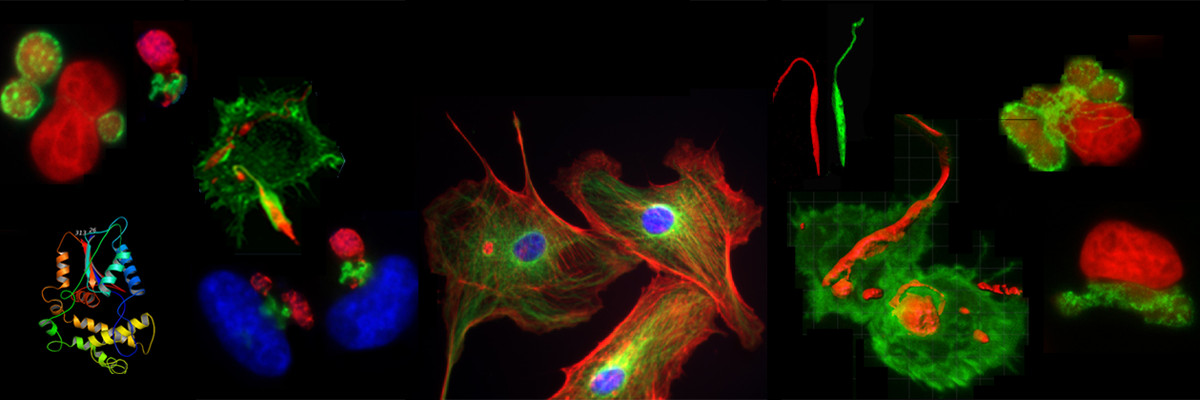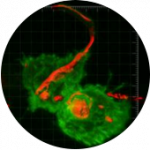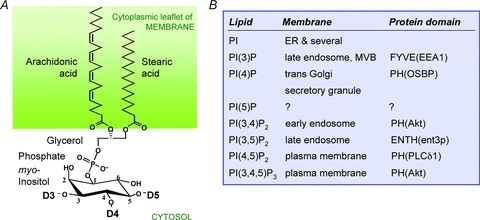

i. Interaction of Leishmania protist pathogens with mammalian host cells
Research in our group focuses on the study of surface (i.e. ecto-enzymes) or secreted proteins of Leishmania donovani as potential virulence factors interacting with the host. Moreover, we study Dual Specificity and PI phosphatases named Atypical Lipid Phosphatases (ALPs) expressed only in microorganisms some of which are pathogenic (Beresford, N.J. et al. 2010) as potential candidate drug targets.
Along the same line, in an effort to discover new drug targets for development of anti-leishmania compounds we focus on parasite proteins involved either in phosphoinositide (PI) metabolism (i.e. PI phosphatases or kinases) or are PI effectors through their PI binding domain. PIs regulate vital cellular processes and thereby proteins interacting with them play essential roles in a cell’s life. The field of PI signaling and PI binding proteins in Leishmania is very poorly studied and our study highlights important molecules for further analysis in parasite’s life and in virulence.
Lastly, we use the nonpathogenic to humans Leishmania tarentolae (L. tarentolae) species as 1) system for recombinant eukaryotic protein expression (Biotechnological applications) and 2) in vitro system for screening anti-leismanial compounds.
Single celled eukaryotic parasites of the Leishmania genus, belong to the Trypanosomatidae order of the Kinetoplastid class of protists. They are dimorphic, living as flagellated forms (promastigotes) in the gastrointestinal tract of their sandfly vector and as aflagellated forms (amastigotes) mainly inside modified phagolysosomes of mammalian host phagocytes. Metacyclic infectious forms of Leishmania promastigotes are transmitted to the mammalian host upon a blood meal of the insect vector (sandflies Phlebotomus or Lutzomyia). The parasite establishes infection in macrophages by which it is carried in organs distant from the site of infection as the liver, spleen and bone marrow in the case of visceral Leishmaniasis. Survival and propagation of the parasite in the professional phagocytes is due to interference and subversion of host signaling pathways related to many aspects of cell physiology including the ones of intracellular trafficking and secretion, phagolysosome biogenesis and apoptosis.
Infection of mammals with anthroponotic or anthropozoonotic Leishmania spp, causes a wide spectrum of human cutaneous (CL) and visceral (VL) diseases with high socioeconomic burden known as Leishmaniases. Although several drugs against the different forms of Leishmaniasis exist, there is an urgent need to develop new ones due to severe side effects, high cost and the development of drug resistant parasite strains, given that no efficient vaccine against the different forms of Leismaniasis exists for humans.
ii. Anti-cancer properties of Olive oil polyphenols
Olive oil consumption is associated with prevention of many cancer types. Its chemopreventive activity is attributed to olive oil polyphenols (OOPs) such as hydroxytyrosol and tyrosol, along with their secoiridoid derivatives oleuropein aglycon, ligstroside aglycon, oleacein, and oleocanthal. Certain of these compounds have been shown to inhibit cancer cell proliferation and/or induce apoptosis. However, issues concerning safety/toxicity of OOPs, their mechanism(s) of action or synergistic effects in OOPs’ combinations remain to be yet clarified.
 Study of Leishmania donovani surface or secreted proteins as potential virulence factors interacting with the host macrophage
Study of Leishmania donovani surface or secreted proteins as potential virulence factors interacting with the host macrophage
- We have characterized a Leishmania donovani specific membrane bound acid ecto-phosphatase (LdMAcP) and showed that it contributes to parasitic virulence in vitro (Papadaki et al. 2015, DOI: 10.1042/BJ20141371).
- We have characterized a secreted L. donovani phosphoinositide (PI) binding protein, product of the LDBPK_352470.1.1 gene (TriTrypDB), and shown that it belongs to the SNX-BAR subfamily of Sorting Nexins that it is highly conserved along the Evolutionary tree of Eukaryotes (Tziouvara O. et al. 2024, https://doi.org/10.3390/ijms25074095). This is the first Sorting Nexin identified and characterized in Leishmania spp. and is the homolog of the human SNX2 protein. Sorting Νexins constitute a protein family highly conserved in evolution. They have not been studied before in parasites of the Leishmania genus.
 Study of PI phosphatases and PI binding proteins as candidate anti-Leishmanial drug targets
Study of PI phosphatases and PI binding proteins as candidate anti-Leishmanial drug targets
Phosphoinositides (PIs) regulate vital cellular processes in eukaryotes. Thereby proteins interacting with them play essential roles in a cell’s life. The field of PI signaling and PI binding proteins is very poorly studied in Leishmania. Our studies highlight important molecules (PI phosphatases and PI binding proteins) for further analysis in parasite’s life and in virulence.
- We have characterized a L. donovani P-Tyr/PI dual specificity phosphatase, product of the LDBPK_220120 gene and have shown that this enzyme is expressed both in promastigotes and amastigotes with a putative role in the parasites’ differentiation stage from metacyclic promastigotes to amastigotes (Papadaki et al. and Boleti 2021, doi: 10.3389/fcimb.2021.591868)
By, a systematic review and in silico analysis of protein sequences containing PX domain in Kinetoplastea protists we discovered several proteins in Leishmania spp. with an evolutionary conserved PX PI-binding domain, and classified them in four distinct groups on the basis of their overall domain architecture. This study highlighted several new candidates of PI-interacting proteins in Trypanosomatida (Petsana et al. Boleti & Braliou, 2023. doi: 10.3390/ijms241411521).
 Anti-cancer properties of natural products-Olive oil polyphenols
Anti-cancer properties of natural products-Olive oil polyphenols
In collaboration with Prof. P. Magiatis (Section of Pharmakognosy and Natural Products, School of Pharmacy, National Kapodistrian University of Athens) we have initiated a systematic study on the anti-proliferative/cytotoxic effects of six OOPs (some of them never studied before) and of specific polyphenols’ combinations and extracts on multiple cell-culture based cancer models (work funded by a Greek Government/EU grant). This study has provided important results for further in vivo studies using cancer animal models (Papakonstantinou A., Koumarianou, P. et al. 2022, doi: 10.3390/ijms24010003; and Papakonstantinou A., Koumarianou, P. et al. 2023, doi: 10.3390/nu15112538).
2018-2024
Tziouvara O., Petsana M., Kourounis D., Papadaki A., Basdra E., Braliou G.G. and Boleti H. (2024). Characterization of the First Secreted Sorting Nexin Identified in the Leishmania Protists. Int. J. Mol. Sci. 2024, 25(7), 4095; https://doi.org/10.3390/ijms25074095 (IF2022:5.6, 5Y IF: 6.2, Citations_) Q1
Petsana M, Roumia AF, Bagos PG, Boleti H, Braliou GG. (2023). In Silico Identification and Analysis of Proteins Containing the Phox Homology Phosphoinositide-Binding Domain in Kinetoplastea Protists: Evolutionary Conservation and Uniqueness of Phox-Homology-Domain-Containing Protein Architectures. Int J Mol Sci.;24(14):11521. doi: 10.3390/ijms241411521. PMID: 375112 (IF2022:5.6, 5Y IF: 6.2, Citations_) Q1
Papakonstantinou A, Koumarianou P, Diamantakos P, Melliou E, Magiatis P, Boleti H. (2023). A Systematic Ex-Vivo Study of the Anti-Proliferative/Cytotoxic Bioactivity of Major Olive Secoiridoids' Double Combinations and of Total Olive Oil Phenolic Extracts on Multiple Cell-Culture Based Cancer Models Highlights Synergistic Effects. Nutrients. 15(11):2538. doi: 10.3390/nu15112538. PMID: 37299499 (IF2022:5.9, 5Y IF: 6.6, Citations:1) Q1
Papakonstantinou A, Koumarianou P, Rigakou A, Diamantakos P, Frakolaki E, Vassilaki N, Chavdoula E, Melliou E, Magiatis P, Boleti H. (2022). New Affordable Methods for Large-Scale Isolation of Major Olive Secoiridoids and Systematic Comparative Study of Their Antiproliferative/Cytotoxic Effect on Multiple Cancer Cell Lines of Different Cancer Origins. Int J Mol Sci. 24(1):3. doi: 10.3390/ijms24010003. PMID: 36613449 (IF2022:5.6, 5Y IF: 6.2, Citations: 6) Q1
Papadaki A., Tziouvara O., Kotopouli A., Koumarianou P., Doukas A., Rios P., Tardieux I., Köhn M., Boleti H. (2021). The Leishmania donovani LDBPK_220120.1 gene encodes for an atypical Dual Specificity Lipid-like phosphatase expressed in promastigotes and amastigotes; Substrate specificity, intracellular localizations and putative role(s). Frontiers in Cellular and Infection Microbiology, section Parasite and Host, 11:591868. doi: 10.3389/fcimb.2021.591868 (IF2022:5.7, 5Y IF: 5.9; Citations _) Q1
Chavdoula E., Habiel D.M., Roupakia E., Markopoulos G.S., Vasilaki E., Kokkalis A., Polyzos A.P, Boleti H., Thanos D., Klinakis A., Kolettas E., Marcu K.B. (2019). CHUK/IKKalpha loss in lung epithelial cells enhances NSCLC growth associated with HIF up-regulation. Life Science Aliance, 2(6). http://doi.org/10.26508/lsa.201900460 (IF 2023: 5.781, Citations: 7) Q1
Papadaki A. and Boleti H. (2019). Measurement of Acid Ecto-phosphatase Activity in Live Leishmania donovani Parasites. BioProtocols (A peer-reviewed protocol journal) following journals’ invitation https://bioprotocol.org/e33843. (IF2022: 0.8 & 5Y IF: 1.3, Citations: 2)
Frakolaki E, Kalliampakou KI, Kaimou P, Moraiti M, Kolaitis N, Boleti H, Koskinas J, Vassilacopoulou D, Vassilaki N. (2019). Emerging Role of l-Dopa Decarboxylase in Flaviviridae Virus Infections. Cells 8 (8). pii:E837. doi:10.3390/cells8080837.PMID:31387309 https://www.mdpi.com/2073-4409/8/8/837 (IF2022: 6.0, 5Y IF: 6.7_Citations: 18) Q1
Doukas A, Karena E, Botou M, Papakostas K, Papadaki A, Tziouvara O, Xingi E, Frillingos S, Boleti H. (2019). Heterologous expression of the mammalian sodium-nucleobase transporter rSNBT1 in Leishmania tarentolae. Biochim Biophys Acta Biomembr. 1861(9):1546-1557. doi:10.1016/j.bbamem.2019.07.001. PMID:31283918 (IF2023: 4.02, 5Y IF: 3.5; Citations: 7) Q2
Braliou GG, Kontou PI, Boleti H, Bagos PG. (2019). Susceptibility to leishmaniasis is affected by host SLC11A1 gene polymorphisms: a systematic review and meta-analysis. Parasitol Res. 118(8):2329-2342 doi:10.1007/s00436-019-06374-y. Review. PMID: 31230160 (IF2022: 2.2; 5Y IF: 2.0_Citations: 18) Q3
Vakrakou AG, Boiu S, Ziakas PD, Xingi E, Boleti H, Manoussakis MN. (2018). Systemic activation of NLRP3 inflammasome in patients with severe primary Sjögren's syndrome fueled by inflammagenic DNA accumulations. J Autoimmun. 91:23-33. PMID: 29551295; DOI: 10.1016/j.jaut.2018.02.010 (IF2023: 14.5, 5Y IF: 7.593_Citations: 81) Q1
2010-2024
PhD theses
Ongoing
Marina Petsana (Bioinformatician, BSc, MSc from the Department of Informatics with applications in Biomedicine, School of Sciences, University of Thessaly, Greece). Thesis title: Identification, evolutionary path analysis and structural and functional characterization of proteins with structural phosphoinositide binding domains in parasitic protozoa Leishmania and Trypanosoma. HPI Nostos Foundation PhD Fellow.
Initiation date: March 2024
Defended
- Olympia Tziouvara (Biologist, BSc ΜSc). Medical School, National Kapodistrian University of Athens. Thesis title: PI phosphatases and PI binding proteins of the Leishmania protozoan parasite: Characterization of two representative molecules and study of their role in the parasite life cycle and in the infection of the mammalian host. Defense: March 2024
- Katherine Papakonstantinou (Pharmasist BSc, ΜSc), Pharmacy School, University of Athens. Thesis title: Development of new Analytical techniques for the Bioactive phenols of Olives and study of their activity in humans. Defense: March 2024
- Amalia Papadaki, Medical School, U. of Ioannina.
Thesis Title: Study of the molecular mechanisms underlying Leishmania spp. survival within the phagocytes of the mammalian host. Defense: April 2015
MSc theses
Marina Petsana, Department of Informatics with applications in Biomedicine, School of Sciences, University of Thessaly, Greece. Thesis title: Biochemical Identification of molecular partners of the Leishmania donovani secreted Sorting Nexin encoded by the LdBK_352470 gene. Defense: Dec. 2022.
Georgios Dimotsantos, Biology Department, National Kapodistrian University of Athens (MSc program “Microbial Biotechnology”). Thesis title: The microorganism Leishmania tarentolae as a tool for the expression and isolation of recombinant proteins from homologous microorganisms in order to perform their biochemical and functional characterization. Defense: Dec. 2021
MSc Alexis Gachet-Ieremiadis, M1 Master 1 Health engineering / Management of biotechnology, Grenoble Alpes University (UGA). Thesis title: Expression in E. coli and purification of a Leishmania donovani phosphoinositide binding protein from the nexin family (LdPIBPnex). Defense: June 2017
Drosos Kourounis, Biology Dept, U. of Athens (MSc program Applications of Biology in Medicine). Thesis title: Cloning and molecular characterization of the secreted Phosphoinositide Binding nexin-like protein LdPIΒPnex from the protozoan Leishmania donovani. Defense: Mar. 2017
Olivia Paraskevi Tziouvara, Biology Dept, U. of Athens (MSc program Applications of Biology in Medicine). Thesis title: Molecular and functional characterization of the Tyrosine and phosphoinositide phosphatase LdTyrPIP_22, from the protozoan parasite Leishmania donovani. Defense: Mar. 2017
Mathias Richard, Faculté de Sciences, U. of Montpellier, MSc BioPMBB-IMH. Thesis title: Molecular Biology of the protozoan parasites Leishmania donovani: Cloning of an L. infantum putative phosphatase into plasmid vectors for expression of His-tagged or mCherry-tagged protein in bacteria, mammalian and Leishmania cells. Defense: June 2015
Anargyros Doukas, Biology Dept, U. of Athens (MSc program Microbial Biotechnology). Thesis title: Construction and characterization of transgenic strains of the protozoan Leishmania tarentolae for heterologous expression of the red fluorescent protein mCherry and nucleobase transporter rSNBT1 from Rattus norvegicus. Defense Jan. 2015
Anastasia Kotopouli, Chemistry Dep., U. of Athens (MSc Program Biochemistry)
Thesis title: Cloning, molecular and functional characterization of the putative phosphoinositide phosphatase LdPIP22 from the parasitic protozoan Leishmania donovani. Defense: Feb. 2014
Diploma thesis
Μarina Petsana, Diploma thesis, Dep. of Bioinformatics with applications in Biomedical Sciences, University of Thessaly. Thesis title: Bioinformatics Analysis of the protein encoded by the gene LdBK_352470.1 of the Leishmania donovani protozoan parasite. Presented: Feb. 2021
Maria Kotini, Diploma thesis, Biology Dept., of Athens.
Thesis title: Construction and characterization of transgenic parasites Leishmania donovani expressing the red fluorescent protein mRFP1and of anti-mRFP1 polyclonal antibody. Presented: Nov. 2009
Teaching in graduate programs (2010-2020)
2020 – Lecture: The flagellated protozoan parasite Leishmania tarentolae as a model for expression of recombinant eukaryotic proteins and for the study of cilia biogenesis (ciliogenesis). MSc program «Functional analysis of genes: From the design to the Live systems (ΛΣΕΣ)», Medical School, University of Ioannina
2018 – Lecture: The protozoan flagellated parasite Leishmania as a model for expression of recombinant eukaryotic proteins and for the study of ciliogenesis”. MSc program “Microbial Biotechnology” Biology Department, University of Athens.
2011-2017- Lectures: Leishmania tarantolae, a eukaryotic cell system with important biotechnological applications». MSc program «MICROBIAL BIOTECHNOLOGY», Department of Biology, University of Athens
2015 – Lectures: Host-Cell mechanisms that become targets of intracellular pathogens» MSc program «APPLICATIONS OF BIOLOGY IN MEDICINE» Biology Department, University of Athens
2011-2014 – Lectures: Study of Cellular Organization with modern Fluorescence Microscopy techniques. MSc program “BIOCHEMISTRY”, Department of Chemistry, University of Athens
Organization of International and National courses/workshops
2004-2006
Six Workshops on Light Microscopy. Greek General Secretariat of Research and Technology European project "Human Networks for training in Research and Technology". A Greek Light Microscopy Network was established for this project with members the Hellenic Pasteur Institute, U. of Ioannina, U. of Crete, the Institute for Biomedical Research in Ioanninaelenic Hellenic Pasteur InsturHellenic and three private companies.
2007-2008
Cutting edge technologies and their contribution to the Biomedical Sciences. Two 3-day practical courses for Biology Teachers of Secondary School education. An activity for diffusion of Advanced Scientific Knowledge to selected groups of society. ( Poster )
2013
Digital image processing/analysis tools in Light Microscopy: From the basics and beyond. Institut Pasteur Network Regional course 2013 ( Poster )
2016
Cell Biology and infection: Digital Image Processing/Analysis Tools for Quantitative Light Microscopy Imaging. Institut Pasteur International Network course 2016 ( Poster )
2017-2024
2024
Nostos Foundation/Hellenic Pasteur Institute PhD fellowship awarded to predoctoral fellow Marina Petsana.
Project title: Identification, evolutionary path analysis and structural and functional characterization of proteins with structural phosphoinositide binding domains in parasitic protozoa Leishmania and Trypanosoma.
Supervisor of PhD student: Dr H. Boleti.
Grant initiation date: March 1, 2024
Grant duration: 36 months
Budget: 30.000,00 €
2023
Service contract from the Peloponnese State District-National Recovery and Resilience Fund (project code 7-6-29-03)
Project title: « Ex vivo and in vivo preclinical study of the contribution of extra virgin polyphenolic olive oil to cancer prevention and well-being ».
Scientific responsible: Dr H. Boleti.
Grant initiation date: Dec. 13, 2023
Grant duration: 18 months.
Budget: 30,000 €
2022
ΕΜΒΟ scientific exchange grant supporting international collaborations, enabling transfer of expertise (#9372) awarded to the PhD student Olyvia Tziouvara.
Project title: Generation of TyrPIP_22 L. major KO parasites.
Supervisor at the U. of Glasgow: Dr Eva Gluenz.
Supervisor in HPI: Dr H. Boleti.
Grant initiation date: 25 April 2022
Grant duration: 39 days
Budget: 3,000 €
2020
CALMETTE YERSIN PhD fellowship Institut Pasteur International Network (IPIN) PhD fellowship awarded to Daniel Carrasco Navarro
Project title: “ Identification of molecular partners and functional characterization of a secreted Sorting Nexin (SNX) Protein from the protozoan parasite L. donovani; the first SNX to be studied from Leishmania spp.” PhD interrupted in 1 year.
Supervisor in HPI: Dr H. Boleti.
Grant initiation date: October 2020
Grant duration: 36 months
Budget: 60,000€
2019
Ministry of Development and Investment/grant Code ΕΒΒΜ103.
“Supporting researchers with emphasis on young researchers – B cycle”-“Human Resources Development, Education and Lifelong Learning” on Priority Axis 6, co-funded by the European Social Fund (ESF).
Project title: In vitro study of the anticancer properties of polyphenols from greek olive oil.
Coordinator: Dr H. Boleti
Grant initiation date: End of 2019
Grant duration: 15 months
Budget: 45,500€
H.F.R.I (Hellenic Foundation for Research and Innovation) PhD grant awarded to Olympia Tziouvara (grant number: 606)
Project title: “PI phosphatases and PI binding proteins of the Leishmania protozoan parasite: Characterization of two representative molecules and study of their role in the parasite life cycle and in the infection of the mammalian host”.
Supervisor of PhD student: Dr H. Boleti.
Grant initiation date: October 2019
Grant duration: 30 months
Budget: 27,000€
2018
ΒΙΟΙΜAGING GR: “Hellenic Research Infrastructure for the Imaging and Observation of Fundamental Processes in Biology and Medicine” (MIS 5002755) which is implemented under the Action “Reinforcement of the Research and Innovation Infrastructure”, funded by the Operational Programme “Competitiveness, Entrepreneurship and Innovation” (NSRF 2014-2020) and co-financed by Greece and the European Union (European Regional Development Fund). Responsible for 2WPs of the HPIs participation in the Infrastructure Network.
Budget for Intracellular parasitism team: 30.702,00 €
«INSPIRED: The National Research Infrastructure on Integrated Structural Biology, Drug Screening Efforts and Drug target functional characterization» (MIS code 5002550). WP.2.1, WP 2.2
2017
KRIPIS II: DEVELOPMENT GRANTS FOR RESEARCH INSTITUTIONS/Greek General Secretariat for Research and Technology
Project title: “Infectious, autoimmune and neurodegenerative diseases: study of the pathogenetic mechanisms and development of diagnostic, prognostic and therapeutic approaches”
Subproject ΠΕ 3.3: Structural and functional characterization of the Tyrosine and Phosphoinositide phosphatase LdTyrPIP_22 of the protozoan parasite Leishmania donovani (Μ4-Μ24) with aim to point out new chemotherapeutical targets from anti-leismanial drugs (Coordinator Hellenic Pasteur Institute).
Grant duration: 24 months.
Budget for Intracellular parasitism team: 22.900,00 €
SPONSORSHIPS 2014-2024
2021
Leventis foundation ![]()
1 Year PhD fellowship to the PhD candidate Katerina Papakonstantinou
Project title: In vitro study of the anticancer properties of polyphenols from Greek olive oil.
Budget: 10.040,00 €
2019
World Olive Center For Health (WOCH) 
Project title: In vitro study of the anticancer properties of polyphenols from Greek olive oil.
Budget: 4.500,00 €
2014
Abbvie ![]() Pharmaceutical Company to the “Intracellular parasitism” group supporting its research projects against Leishmaniasis.
Pharmaceutical Company to the “Intracellular parasitism” group supporting its research projects against Leishmaniasis.
Budget: 5.000,00 €
2024
PhD fellowship to Marina Petsana (36 months) from Νostos foundation/Hellenic Pasteur Institute
2022
EMBO Scientific Exchange Fellowship to Olympia Tziouvara for training in the CRISPR/Cas9 technology
2020
H.F.R.I (Hellenic Foundation for Research and Innovation) PhD grant awarded to Olympia Tziouvara (grant number: 606)
2016
Poster award at the 67th Panhellenic conference of the Hellenic Society of Biochemistry and Molecular Biology, Ioannina, (25-27 Nov. 2017). Title: LdPIΒPnex, a secreted nexin-like protein from the protozoan parasite Leishmania donovani. Authors: Drosos Kourounis, Amalia Papadaki, Olympia Tziouvara, Haralabia Boleti, Intracellular parasitism group, Hellenic Pasteur Institute
Postdoctoral fellows
• Petrina Koumarianou, Cellular Biologist, (2018 - 2022)
PhD students
• Olympia Tziouvara, Biologist, (2018-2023), https://www.linkedin.com/in/olympia-tziouvara-b5328b1aa/
• Katerina Papakonstantinou, Pharmacist, (2018-2023), https://www.linkedin.com/in/katerina-papakonstantinou-941792262/
• Amalia Papadaki, Veterinarian, (2010-2015)
• Panagiotis Sapountzis, Biologist, (2007 - 2008), https://www.linkedin.com/in/panagiotis-panos-sapountzis-18a11194/
Postgraduate students (MSc)
• Maria Tasakou, Agriculturalist, (2021-2022), https://www.linkedin.com/in/maria-tasakou-4ba77b190/
• George Dimotsantos, Biotechnologist, (2018-2020), https://www.linkedin.com/in/george-dimotsantos-1822b346/
• Drosos Kourounis, Biologist, (2015-2017), https://www.linkedin.com/in/drosos-kourounis-3456a2144/
• Olympia Tziouvara, Biologist, (2014- 2017), https://www.linkedin.com/in/olympia-tziouvara-b5328b1aa/
• Alexis Gachet-Ieremiadis, Biotechnologist, ΜSc Internship (Apr.-Ιούν. 2017), https://www.linkedin.com/in/alexis-g1/
• Aris Doukas, Chemist, (2012-2015)
• Mathias Richard, Biologist , BioPMBB-IMH U. de Montpellier (Feb. 2015-July. 2015), https://www.linkedin.com/in/matthias-richard-526540a6/
• Anastasia Kotopouli, Chemist, (2011 -2014), https://www.linkedin.com/in/anastasia-kotopouli-26aa2976/
Graduates with voluntary work/Practical training
• Christos Karampelas, Molecular biologist, (Nove. 2014 - May 2015), https://www.linkedin.com/in/christos-karampelas/details/experience/
• Ioanna Palaka, Biologist, (Jan. – May 2019), https://www.linkedin.com/in/ioannapalaka/?originalSubdomain=gr
Undergraduate students (3-month practical training/or Bachelor thesis)
• Hakan Nizam, Agriculturalist, (Oct. 2020-Ιαν. 2021), https://www.linkedin.com/in/hakan-nizam-571288218/
• Maria Mpoulougari, Biotechnologist, (June.- Aug. 2019), https://www.linkedin.com/in/maria-boulougari/
• Dafni Trantafyllou, Biologist, (July. 2015), https://www.linkedin.com/in/dafni-triantafyllou-aa060a12a/details/experience/
• Dafni Apostolidou, Summer internship (June.-July. 2014), https://www.linkedin.com/in/daphneapostolidis/details/experience/
• Maria Kotini, Biologist, (2007-2008), https://www.linkedin.com/in/maria-kotini-a58a6a5b/
• Paraskevi Mikelli, Biotechnologist
• Georgia Iwannou, Biotechnologist
Visiting scientists
• Rositsa Tropcheva, Food biotechnologist, (BSc, MSc, PhD), Yersin-Calmette fellow (June.-Aug. 2015), https://www.linkedin.com/in/rositsa-tropcheva-29607538/?originalSubdomain=bg

Petsana Marina


